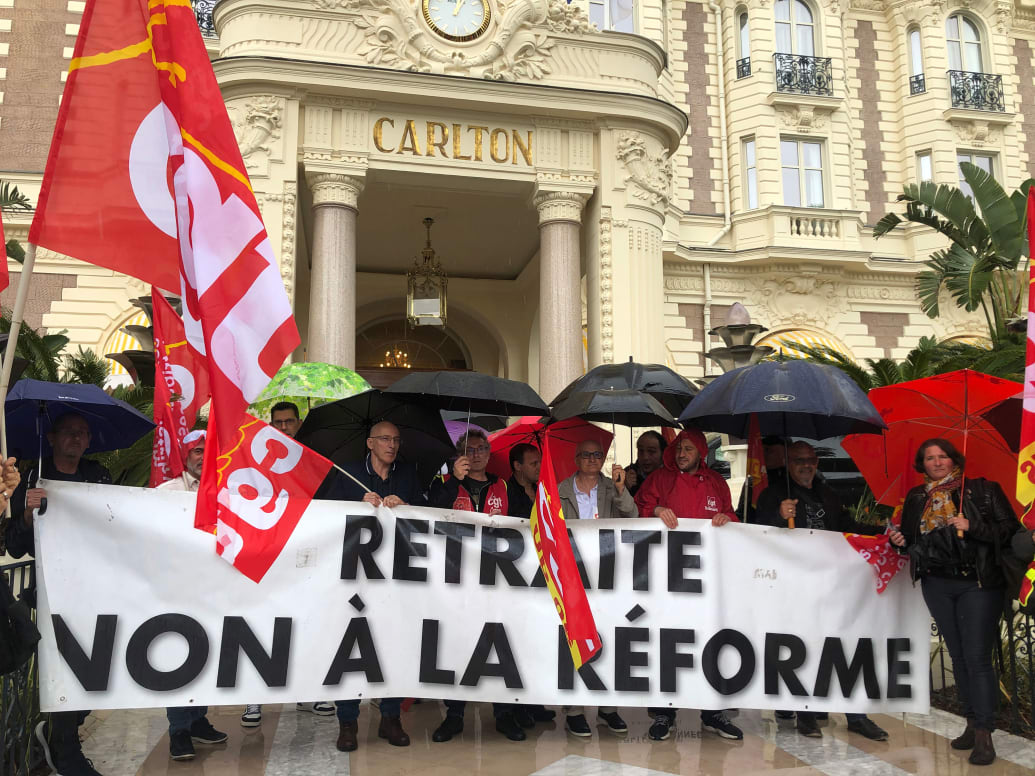CANNES—It was business as usual on Friday afternoon inside the lobby of the Carlton, the opulent five-star hotel that often hosts high-profile guests during the Cannes Film Festival.
A crew in black-tie attire was smiling for photos as they prepared to hit the red carpet, smartly dressed guests tapped away on their phones, and new arrivals trickled in from glitzy SUVs. Whispers swirled of an upcoming press conference for the new Indiana Jones movie.
But just around the time Harrison Ford appeared inside one of the hotel conference rooms, a very different scene was playing out on the front steps of the building.
A couple of dozen workers from local hotels and restaurants unfurled a banner against the French government’s recent hike in the retirement age, fielding questions from the press before shouting chants against the unpopular reform.
Zakaria Rami, a 49-year-old receptionist who’s worked 20 years at the Carlton, told The Daily Beast he’d come to highlight the sector’s difficult working conditions and demanding hours. “I work nights, I’m on my feet, we’re also asking to be better compensated for our difficult working conditions,” he said.
Cole Stangler
Friday’s rally was highly unusual for another reason: all of the demonstrators were confined to hotel property, surrounded by a ring of steel barriers separating them from the public sidewalk along the iconic Croisette. That’s because for the entirety of the two-week festival, local police have outlawed all protests within a broadly defined zone in downtown Cannes, citing alleged “threats to public order.” Offenders risk a 135 euro ($145) fine.
“It’s totally ridiculous that we can’t be in public spaces and hold rallies on the Croisette,” Céline Petit, a CGT union official at the rally, told The Daily Beast. “But it’s very important to protest at Cannes to give visibility to our demands.”
As with any crowd at Cannes, the sea of red flags did attract curious passersby, but many went along their merry way when they realized there were no stars in sight.
The Buildup
The protest ban in Cannes is symptomatic of a spiraling trend. While the right to protest is constitutionally protected in France, the country’s police prefects are increasingly moving to ban public demonstrations—typically citing alleged “threats to public order” and forcing lawyers to hastily challenge them in court, with varying degrees of success.
“It’s absolutely scandalous,” Jean-Baptiste Soufron, a lawyer and leading member of the Constitutional Freedom Defense Association (ADELICO) told The Daily Beast. The organization he works with is modeled after the American Civil Liberties Union (ACLU), and has failed to overturn the Cannes ban in court. “There are limits to the right to protest, but this measure is way too broad,” Soufron said.
In recent weeks, the list of similar orders has piled up: a series of bans on protests in towns visited by President Emmanuel Macron—overturned in some cases—and a ban on demonstrations outside the Stade de France before the annual Coupe de France football cup final, which was also overturned.
Arguably the most notable order was the ban on protests during commemorations of World War II Victory Day in Paris, which was ultimately upheld, leading to surreal scenes of the presidential motorcade traveling along an empty Champs-Elysées.
“We’re up against a method that doesn’t respect countervailing powers.”
As at the Cannes Film Festival, these bans are sometimes coupled with measures authorizing drone surveillance. “What’s exceptional is the number of measures in such a short period of time,” Serge Slama, a law professor at Grenoble Alpes University, also a member of ADELICO, told The Daily Beast.
The recent flurry of bans dates back to late March, after mass demonstrations broke out over the government deploying a constitutional maneuver that allowed it to approve pension reform without a vote in the National Assembly. But according to Slama, the foundations were laid earlier, starting with the state of emergency that followed the Paris terrorist attacks of November 2015.
“If you want to understand the roots of what’s happening right now, you have to go back to 2015, 2018, and 2020,” he said, referring to the outbreak of the Yellow Vest protest movement and the state of emergency in the early stages of the COVID-19 pandemic. “That’s when prefects developed this addiction for their power to outlaw protests.”
A Slippery Slope
Either way, there are few, if any, precedents for French police systematically deploying protest bans like they are today. As the law professor Olivier Cahn argued in a recent interview with Le Monde, the only comparable era was during the Algerian War, when authorities directed protest bans at Algerians living in France. (At that time, the Paris police prefect was Maurice Papon, later found guilty of complicity in crimes against humanity for his role in organizing the deportation of Jews during World War II.)
Along with other practices like mass detentions, police violence, and increased surveillance, the wave of restrictions is sparking growing concern about the general state of French democracy. The question of whether France is in the midst of an “authoritarian slide” (une dérive autoritaire) has become a hot topic in mainstream media.
For his part, lawyer Jean-Baptiste Soufron said he prefers the term “authoritarian method” to describe the government’s handling of dissent.
“I don’t like the word ‘slide’ because it implies all of this is a slippery slope,” he said. “That’s not what’s happening. We’re up against a method that doesn’t respect countervailing powers.”
Fabien Goa, a France-based researcher for Amnesty International, also criticized authorities for undermining the right to protest at Cannes and elsewhere.
“Some of the justifications for restricting or banning protests cited by prefects of late have too often resembled an experimentation lab, which suggests the French authorities have their priorities skewed when it comes to fulfilling their duty to facilitate the right to peaceful assembly,” Goa told The Daily Beast. “Under international human rights law, the prohibition of a specific assembly can be considered only as a last resort.”
While alarmed by the flurry of bans, Serge Slama stressed that French democracy is still far from resembling its counterparts in Poland or Hungary. “We’re not yet at this level,” he said. “We still have a lot of protections. Fortunately, there’s a civil society, a free press, the ability to go to judges, to reverse bans in court.”
That opposition from civil society will likely be very much visible again on the streets of Cannes. On Sunday, unions are planning to hold a much larger march outside the no-protest zone.
Céline Petit said the dissent was also about getting back to the roots of the Cannes Film Festival, when trade unionists played a leading role in its organization.
“This festival should remain popular and accessible, not just filled with glitter and capitalism and economic liberalism,” she told The Daily Beast on Friday. “It’s not very working-class today, but this festival should be accessible to everyone, to all citizens.”






